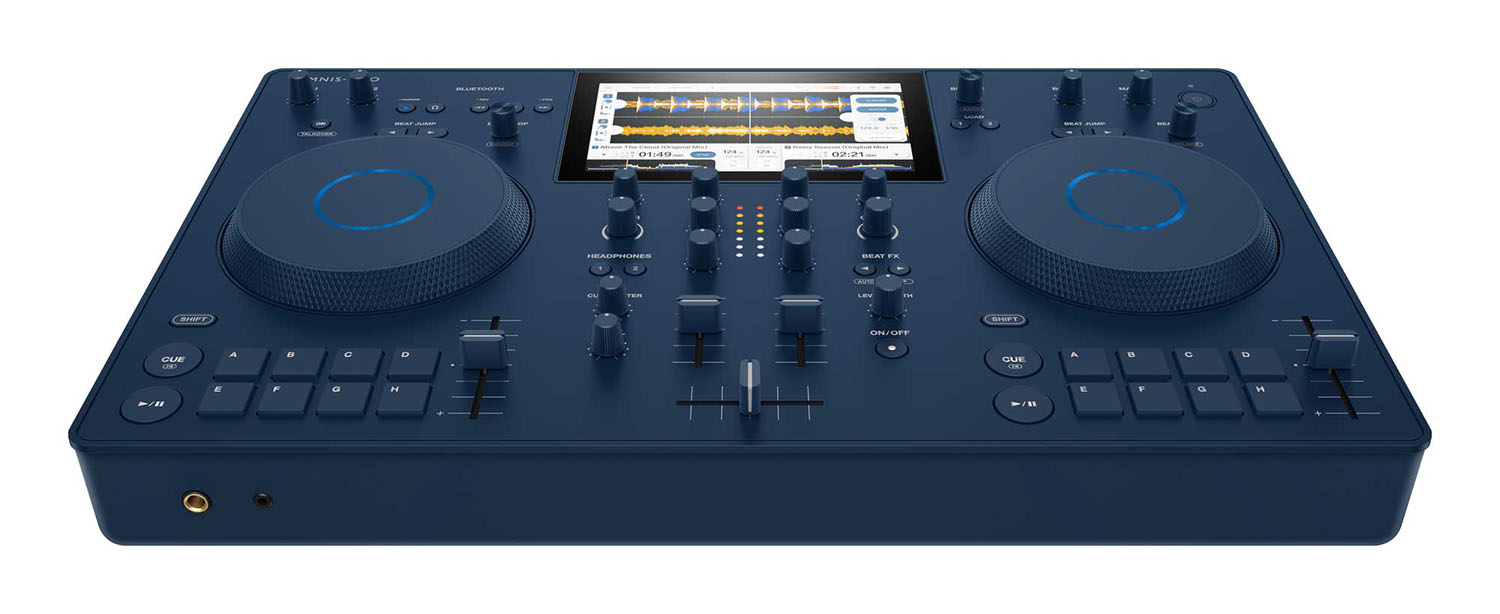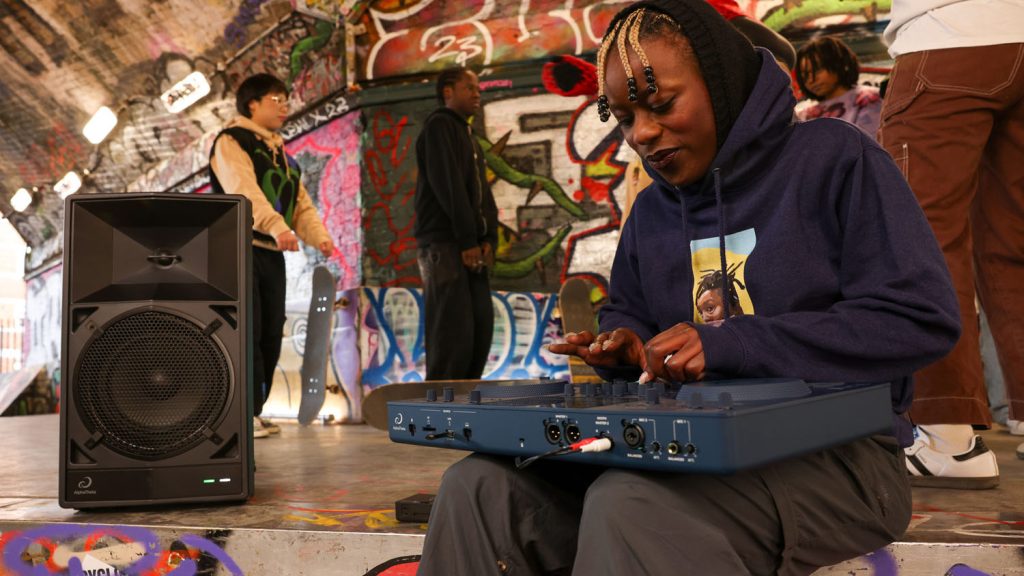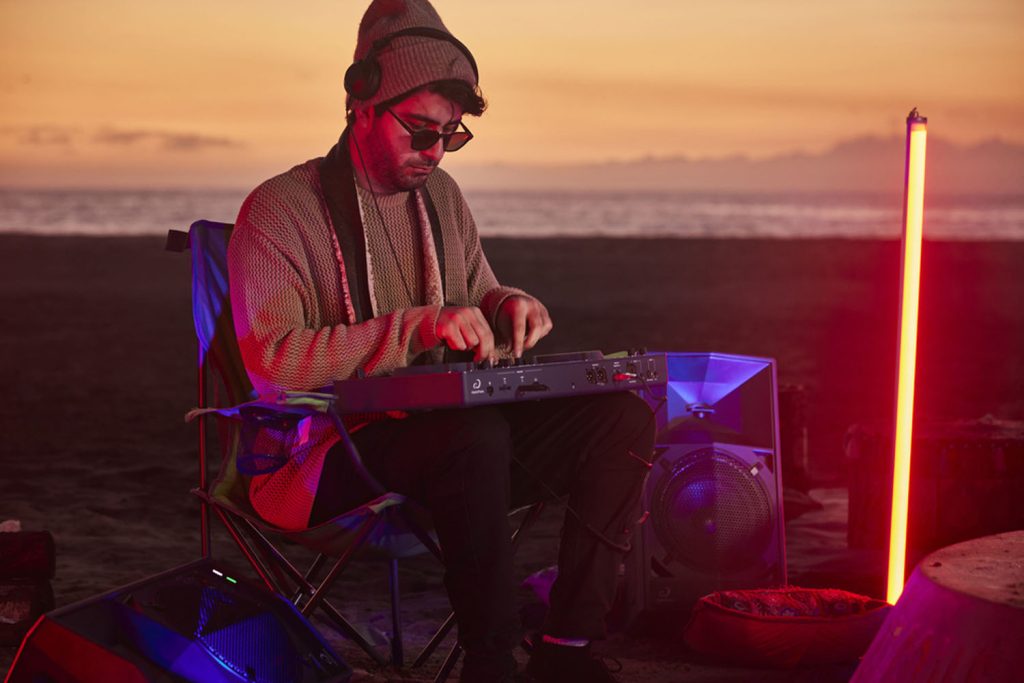For today’s DJs, parties, festivals and rehearsals can happen any time, anywhere. The need for spontaneity has led AlphaTheta to develop a new wireless, battery-powered system with a new aesthetic to match.
Deep indigo, the matte colour chosen for the Omnis-Duo controller from AlphaTheta, softens the edges of this state-of-the-art piece of DJ kit, making it look and feel more tactile than any of its predecessors.
“We dedicated considerable time and effort to perfecting the colour, materials and finish,” says Muneki Sugita, product designer at AlphaTheta.
“We aimed to create an appearance that would encourage customers to take the product outside, while also considering practical aspects such as portability and operability. The colours, materials, and finishes were carefully selected and adopted to achieve this balance.”
The controller’s designers proposed many ideas in their concept sketches, to match a variety of scenarios, he adds. The decisive factor in the final selection process? “Choosing an idea that aligned with our initial goal of ensuring that anyone can enjoy DJing at any time and place, including day, night and outdoor environments.”
AlphaTheta is the evolution of the Pioneer DJ brand, a well-respected name in professional audio equipment and DJ controllers. As performances begin to shift from dark nightclubs to daytime parties held on beaches and in parks, it is looking to reshape the way that DJs plan and play their sets.
The goal for the Omnis-Duo, in particular, was to create a product that could entertain in any surrounding, at any time and in any place. Visually and technically, it’s a radical departure from the traditional ‘black box’ designs typically associated with DJ equipment.
Battery-powered, and with Bluetooth audio output and ultra-low-latency wireless connectivity, it even enables users to take requests by quickly recording a track from an app on a phone, for example, and then allowing the DJ to add it to a set.

Inside out
The Omnis-Duo was designed from the start with the idea of encouraging customers to take it outside, while also considering practical aspects such as portability and operability, says Kazuhiro Ohnuma of the AlphaTheta hardware design management division. Early 3D models were built in Rhino 7, while crisp visualisations were created in Keyshot, with colour chips carefully matched to give accurate renders even in the earliest stages of the design process.
The Omnis-Duo also includes many functions that the team behind it were implementing for the first time. That meant starting from scratch in terms of design knowhow and evaluation methods and conducting thorough preliminary research and benchmarking against other companies’ products.
With the expectation that the Omnis-Duo will spend much of its life being carried around, target values for product rigidity, weight and the durability of each control component were considered well in advance. The team used Autodesk Fusion to develop the 3D model, allowing them to perform stress analysis and select appropriate materials.
For AlphaTheta’s first battery-powered product, the team also used thermal analysis tools to address concerns around internal temperature rises when the product is used in different environments, such as on a bed or outdoors.
“We needed to consider various potential accident scenarios, such as user misuse and component failures,” states Ohnuma. “We dedicated the most time to developing and structuring safety mechanisms that would prevent accidents under any misuse or defect condition.”
This in-depth virtual testing was matched by the amount of physical prototyping, which proved invaluable for designing and verifying the product’s safety.
“It also helped us clarify specifications for our Bluetooth-equipped products,” Ohnuma adds, helping verify connectivity with the Omnis- Duo’s partner product, the Wave-Eight Bluetooth speaker.
Sound and colour
Another initiative in the design of the Omnis-Duo was a collaboration with the development department of a paint manufacturer to develop new paints. Since the newly developed colour offered low weather resistance, not ideal for outdoor use, the team worked with this partner on improving weather resistance and conducted accelerated degradation analysis to assess the pace and extent of deterioration over time.
Achieving a consistent deep indigo finish across the entire product also created a challenge, given that various components were manufactured by different suppliers. “Ensuring colour uniformity was a critical aspect of quality control,” says Sugita.
Through collaboration with the parts management departments of each manufacturer, and multiple trials that were carried out alongside the paint manufacturer, the AlphaTheta team was able to achieve the necessary colour grading across the Omnis-Duo for mass production.
The resulting product blends all the familiarity of a professional controller with new levels of fun and portability, enabling the music to go wherever the party takes it.
This article first appeared in DEVELOP3D Magazine
DEVELOP3D is a publication dedicated to product design + development, from concept to manufacture and the technologies behind it all.
To receive the physical publication or digital issue free, as well as exclusive news and offers, subscribe to DEVELOP3D Magazine here








